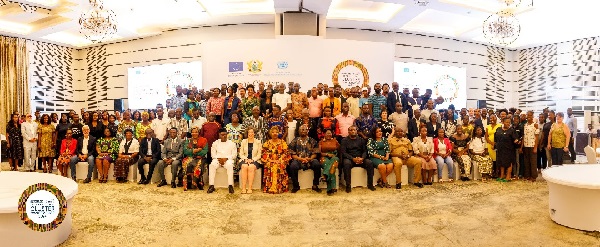
Strategic partnerships key to unlock full potential of SMEs — Trade Minister
THE Minister of Trade and Industry, K.T. Hammond, has stressed the crucial role of strategic partnerships in unlocking the full potential of Micro, Small and Medium Enterprises (MSMEs).
He explained that the MSMEs continue to be the backbone of economies, and any strategic intervention to enhance their smooth operations and competitiveness, especially at this crucial time of economic development, was highly commended.
In a speech read on his behalf at the 3rd Ghana International Cluster Conference in Ghana on Wednesday in Accra, he reiterated how the Government of Ghana’s collaboration with the United Nations Industrial Development Organisation (UNIDO) through the EU-funded West Africa Competitiveness Programme (WACOMP) on trade, industrialisation and private sector development has resulted in enhancing the growth and competitiveness of Ghanaian SMEs.
The conference was organised by UNIDO on the theme: “Ghanaian Clusters, Sharing Solution and Developing Possibilities for Competitiveness”. It was to strengthen cluster inclusiveness for Small and Medium-Scaled Enterprises (SMEs).
Over 200 participants comprising SMEs supported by the EU-funded West African Competitiveness Programme (WACOMP) implemented by UNIDO and MoTI and delegations from ECOWAS, Liberia, Nigeria, and Austria strengthened connections to the African Continental Free Trade Area (AfCFTA).
Support
Mr Hammond said since 2019, the Ministry has worked closely with the UNIDO WACOMP team, receiving substantial support from the European Union.
This partnership, he said, has significantly strengthened the capacities of Ghanaian enterprises, particularly in the cassava, fruits and cosmetics export value chains.
Highlighting the transformative impact of the technical and financial assistance provided through WACOMP, the minister said the support has enabled numerous small businesses to expand their reach to international markets, adding that entrepreneurs have transitioned from operating on a small scale to exporting their products globally, with some earning millions and positively impacting over 44,296 fellow entrepreneurs.
“Above all, the impact of the support through the partnership between the Government of Ghana, the European Union and UNIDO is the rapid growth of private sector jobs, both in industry and agriculture, generating a lot of rural and urban jobs to address widespread unemployment, especially amongst our youth,” Mr Hammond said.
Cooperation
The Officer in Charge of Ghana and Liberia at UNIDO, Stavros Papastavrou, noted the strong cooperation between UNIDO and Ghana, citing the joint commitment to the 2030 Agenda for Sustainable Development.
He highlighted UNIDO’s support to SMEs’ competitiveness and collective efficiency, agribusinesses, skills development, renewable energy, Kaizen expansion and quality which are all geared towards enhancing value addition, sustainable production and access to regional and global markets.
UNIDO Industrial Development Expert and WACOMP- Ghana Project Manager, Ebe Muschialli, shared excitement about the success of UNIDO-supported SMEs under the WACOMP.
“Many of these entrepreneurs have evolved from struggling to comply with market requirements to be part of Ghanaian delegations in international markets.
Their products have improved, the value-added locally has increased and the packaging and branding have become much more attractive,” he said.